FM Einheit (Franz-Martin Strauß by real name) was born in Dortmund in 1958. He works as a composer, musician and music producer. Since 1979 he has been active as a musician in various German formations, including Abwärts and Palais Schaumburg. Since the early 1980s he has been a percussionist and member of the Einstürzenden Neubauten. In addition, he composed acting music for productions by Peter Zadek, Werner Schwab and Hasko Weber, among others. As a producer he worked for KMFDM and Goethes Erben. In addition, he presented numerous radio plays, especially together with Andreas Ammer.
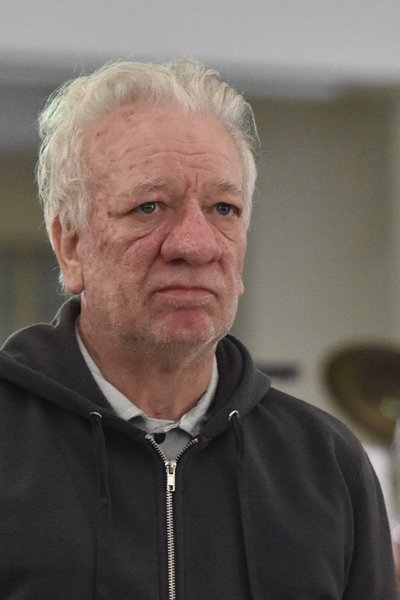
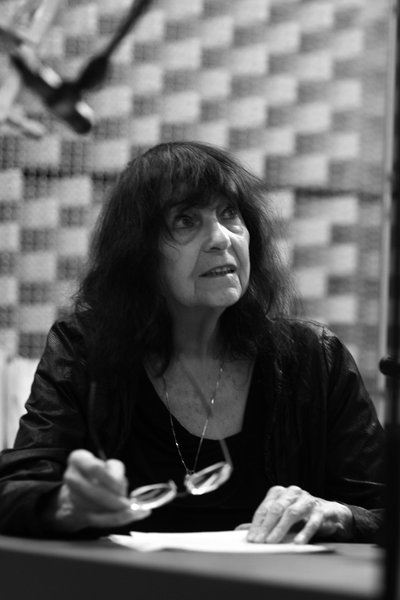
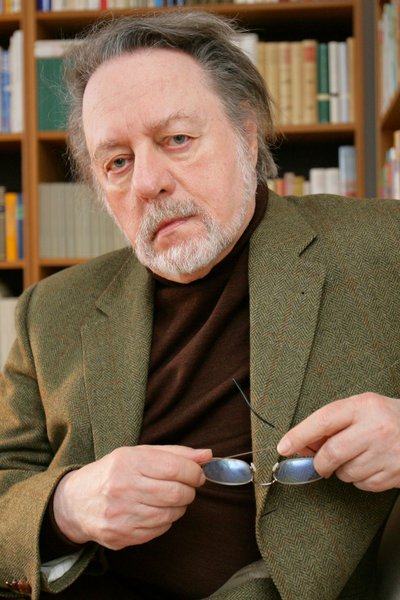
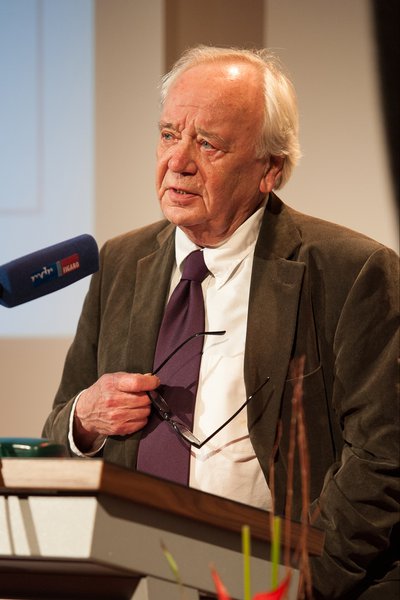

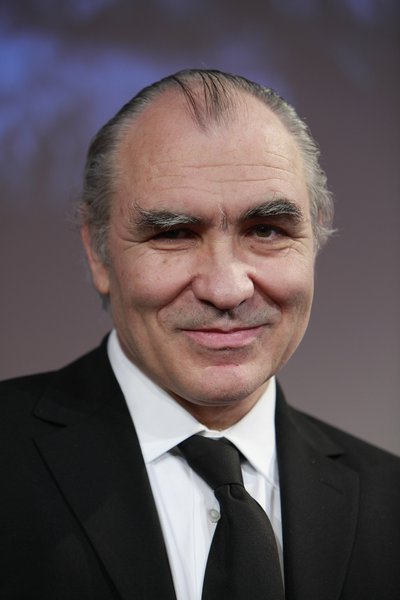
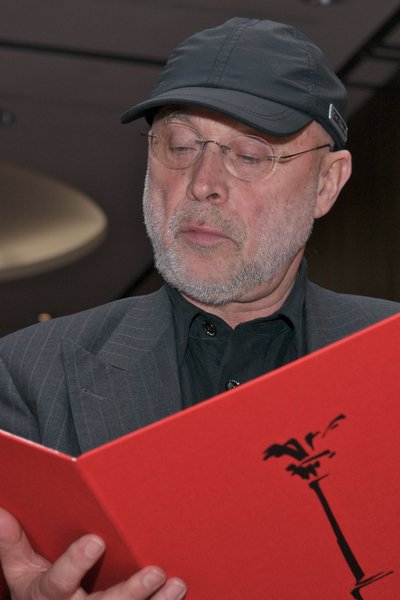


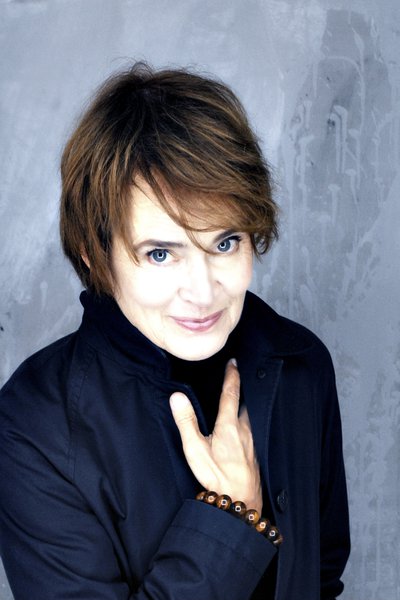

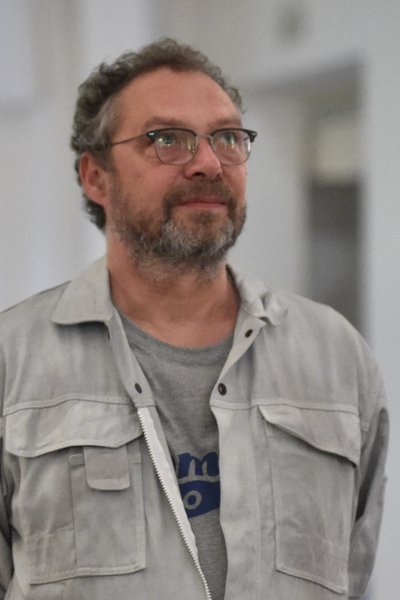
FM Einheit
Friederike Mayröcker †
Friederike Mayröcker, born on 20 December 1924 in Vienna, is one of the most renowned, productive and innovative German-language writers. She began publishing literary works in 1939, and poems in 1946; "Larifari", which appeared in 1956, was her first independent publication. She entered the world of radio drama together with Ernst Jandl and the play "Five Man Humanity", which was written for SWF in 1968 - an almost fifteen-minute piece which helped Germany’s so-called Neues Hörspiel movement to spread. Her collaboration with Ernst Jandl resulted in a number of other radio plays in the following years, but she also began writing her own works. Often voiced by the author herself, these were produced together with directors such as Heinz von Cramer, Klaus Schöning, Ulrich Gerhardt and Götz Fritsch, and with composers including Gerhard Rühm, Mauricio Kagel and Pierre Henry. Back in 1969, when she was awarded the War Blinded Audio Play Prize for "Five Man Humanity", in an explanation of her expectations of the genre she commented that a radio play should "be acoustically satisfying, fascinating, appealing, i.e. the acoustic process must produce a very definite response in the listener, something that is not unlike the enjoyment of music, but that is triggered by words and noises instead of sounds."
Friederike Mayröcker has received many awards, including the Georg Trakl Poetry Prize (1977), the Else Lasker-Schüler Poetry Prize (1996) and the Georg Büchner Prize (2001). She was made an honorary citizen of the city of Vienna in 2015. The jury, chaired by Wolfgang Schiffer (former director of radio plays at WDR), paid tribute to Mayröcker's contributions to the genre. The panel felt that her own radio plays fulfil the requirements she set out in 1969, and that Mayröcker's "superior continuation of concrete poetry strikes an utterly unique pitch." The jury continued: "With plays such as 'The Embracement, After Picasso', her work has taught the sense of sound to see. And in the unique work of Friederike Mayröcker, that sense of sound has long since mastered the ability to sing."
Friederike Mayröcker died on 4 June 2021 in Vienna.
Ror Wolf †
Born on 29 June 1932 in Saalfeld, Thuringia as Richard Wolf, Ror Wolf was both a specialist and a universalist, impossible to confine to just one discipline: He wrote literature, made collage art, and wrote and edited radio plays. Of himself, Wolf said, "I am basically a radio play writer who writes books from time to time." His artwork is accordingly diverse and includes pieces that he produced under Adorno, Horkheimer and others after leaving the GDR in August 1953 and studying literature, sociology and philosophy. His first literary publications appeared in 1958. After having worked as a literature editor for Hessischer Rundfunk for two years, Ror Wolf became a freelance writer in 1963. His debut as a novelist, "Fortsetzung des Berichts" ("Continuation of the report"), was published in 1964. His first radio play, "Der Chinese am Fenster" ("The Chinese man at the window"), was broadcast in 1971 and later became part of the trilogy "Auf der Suche nach Dr. Q." ("Searching for Dr Q"). With his ten live sound soccer collages produced between 1972 and 1979, Ror Wolf became a legend. He was awarded the Radio Play Award of the War-blinded for his radio play biography "Leben und Tod des Kornettisten Bix Beiderbecke aus Nord-Amerika" ("Life and death of the cornetist Bix Beiderbecke from North America"). In 2007, "Raoul Tranchirers Bemerkungen über die Stille" ("Raoul Tranchirer’s comments on silence") was named Radio Play of the Year by the German Academy of Performing Arts.
Ror Wolf died on 17 February 2020.
Jürgen Becker †
The Cologne-based writer Jürgen Becker (born 1932) was one of the most influential literary voices of German radio play who has significantly influenced the radio art with his numerous radio works which arose from 1969 until present. If Günter Eich is known for a specific "Eich sound", then you could also speak of a "Becker sound". By listening to the places and landscapes in which he lived, he became a historiographer of proximity. Thanks to Becker’s accuracy and his own "language music" the seemingly long familiar everyday life becomes a radiophonic echo chamber in which collective history can be experienced in a new and concrete manner. Not least, the reunion with his East German places of childhood changed him into a poetic chronicler of German Reunification during the last two decades.
Jürgen Becker passed away on 7 November 2024.
Hubert Wiedfeld †
The Günter Eich Prize 2011 goes to the radio play author Hubert Wiedfeld, who lives in Hamburg. "Over more than four decades the material and form ideas developed by Hubert Wiedfeld have positively influenced and developed the German-language radio play", the jury justified the choice of the author and writer, who was born in Braunschweig in 1937.
Wiedfeld began producing radio plays in 1969. Before that, he completed an apprenticeship as a bank clerk and worked in a juvenile detention centre as well as in a nursing home. His more than 30 published plays are based on his literary experiences. Today Wiedfeld is regarded as one of the most important radio play authors in the country. The jury judged: "His radio plays reflect contemporary German history - both large and small - in a way that is rarely seen in a radio play author". Wiedfeld's crime, dialect and social fiction games have been awarded the "Prix Italia". The jury included the radio play critic Eva Maria Lenz, the Leipzig journalist Linde Rotta, the editor-in-chief of the "Thüringer Allgemeine" Paul-Josef-Raue and the former head of the literature and radio play department at the Austrian Radio Konrad Zobel. The jury was chaired by Christoph Buggert, radio play director of Hessischer Rundfunk (Hessian Broadcasting Company) until 2002.
Hubert Wiedfeld died on 2 June 2013.
Eberhard Petschinka
The 2009 Günter Eich Prize, awarded by Media Foundation of Sparkasse Leipzig, goes to Eberhard Petschinka, born in Großmugl/Lower Austria in 1953. The jury's statement: "Anger and critical engagement also age. The literary executioners of each epoch must find their own language of form. The radio play author and radio director Eberhard Petschinka has succeeded in this in a convincing way. In his nearly 30 radio plays to date, he has put a large number of contemporary everyday myths to the test.
Eberhard Petschinka, born in 1953, lives in Vienna. Writer, painter, author and director of numerous radio plays. His radio play "Krok" was awarded the Prix Futura in 1995; "Rafael Sanches erzählt mir das Lied vom Tod" (1999) received the Radio Play Award of the War-Blind and the Premio Ondas in Barcelona. For "Splitter" (1999) he was awarded the Basel Radio Play Prize. His play "Blutiger Ernst" premiered in 2001 at the Burgtheater in Vienna. Prose: "zcirkus DERwünsche" - awarded the Karl Anton Foundation Prize for Literature in 2001. 1999 turn to film ("Casanova Matador") and painting (invitation to the Biennale Concart 2004 in Bolivia and 2005 to the 4th International Art Biennale SIART, La Paz - Bolivia 2005). His radio play "Santo Subito" (MDR/ ORF 2007) won the Prix Europa as "Best European Radio Play of the Year" in 2007 and the world's most prestigious radio play prize Prix Italia in 2008. Members of the jury were the Leipzig-based author and journalist Linde Rotta; the long-standing head of the Word/Background Division at Swiss Radio DRS 2, Martin Bopp; the media scientist Hans-Jürgen Krug; the media critic and deputy head of the feature section of the Kölner Stadtanzeiger, Frank Olbert. The jury was chaired by Christoph Buggert, radio play director at Hessischer Rundfunk (Hessian Broadcasting Company) until 2002. Further information on this year's winner Eberhard Petschinka can be found on his personal homepage at www.krok.cc.
Alfred Behrens
Alfred Behrens is the first laureate of the Günter Eich Prize. The jury's statement: "Alfred Behrens, born in Hamburg-Altona in 1944, has enriched the German-language radio play with refreshing and unconventional impulses for more than 35 years. As an important pioneer and pacemaker of pop radio plays, original sound radio plays, social science fiction and audio films, he has always sought new forms of expression in acoustic narrative with a high level of language and media awareness. His manuscripts and concepts do without the fast technical gag, rather they are imaginative research journeys through the acoustic patterns of experience of the medial world. Early on, Behrens decided to direct his work, too; his stories and life stories are audio works written with the microphone. Like few of his generation, this radio poet has remained a tireless exponent and innovator of the art of radio play to this day - and he also strives to pass on his knowledge and skills to younger generations of authors."
Members of the jury were the Leipzig-based author and journalist Linde Rotta, who initiated the creation of the Schreibwerkstatt Radio (Radio workshop); the media critic Frank Kaspar; the media scientist Hans-Jürgen Krug; Konrad Zobel, until mid-2006 head of the Literature and Radio Play Department at the ORF (Austrian Broadcasting Corporation). The jury was chaired by Christoph Buggert, radio play director at Hessischer Rundfunk (Hessian Broadcasting Corporation) until 2002.
Katharina Bihler
Author, director, performer and speaker Katharina Bihler, born in 1967, has been working with experimental theater, music, performance and radio plays since 1990. She conceives, realizes and writes in particular for projects that play with the boundaries of artistic genres and often deal with scientific, historical or European topics. A focus of Bihler's work is on the acoustic medium and the development of radio plays for radio. In 1997 she founded the Liquid Penguin Ensemble together with the composer and double bass player Stefan Scheib. She also works in other projects as a director or live actor.
The themes of Liquid Penguin Ensemble’s projects usually remain the subject of artistic research for a long time and sometimes find different artistic forms of expression over time. Sound installations are further developed into concerts or performances for small or larger ensembles, musical theatre pieces change into a purely acoustic form in radio plays for the radio, motifs and material from their radio plays form the basis for live performances. The most far-reaching project in this regard is "HEAR GRASS GROWING", which started in 2004 as a plant-controlled sound installation, which later resulted in various concerts and performances with plants in the following years, and then formed the starting point for a radio play of the same name (SR public radio, 2007), as a live radio play, that returned to the stage and most recently in 2019, at the invitation of the Modern Vienna Festival, became the basis of a production for young audiences and families as an "open day" at the biolingua Institute.
Stefan Scheib
Stefan Scheib, born in 1965, has been working as a musician in various ensembles with improvised and contemporary music since 1993, including In.Zeit Ensemble, autochthon, SteDaJoDa, in a duo with Elisabeth Flunger or Johannes Schmitz, the string trio hors du cadre as well as in free formation with Klaus Kugel and Frank Paul Schubert. He also works as a composer and arranger for concert, stage and radio productions. In 1997, together with Katharina Bihler, he founded the Liquid Penguin Ensemble for music/radio plays/performances (composition, conception, instruments, sound design). In addition, Scheib is particularly involved in cross-disciplinary projects and receives composition commissions, among other things, by Quatuor Plus, the Philharmonie Luxembourg, Opera mobile and ARD Radio Tatort.
The themes of Liquid Penguin Ensemble’s projects usually remain the subject of artistic research for a long time and sometimes find different artistic forms of expression over time. Sound installations are further developed into concerts or performances for small or larger ensembles, musical theatre pieces change into a purely acoustic form in radio plays for the radio, motifs and material from their radio plays form the basis for live performances. The most far-reaching project in this regard is "HEAR GRASS GROWING", which started in 2004 as a plant-controlled sound installation, which later resulted in various concerts and performances with plants in the following years, and then formed the starting point for a radio play of the same name (SR public radio, 2007), as a live radio play, that returned to the stage and most recently in 2019, at the invitation of the Modern Vienna Festival, became the basis of a production for young audiences and families as an "open day" at the biolingua Institute.
Ulrike Haage
Ulrike Haage (born 1957 in Kassel) has been involved with radio plays for more than 25 years - as a composer, director, scriptwriter and producer. After studying at the University of Music and Performing Arts in Hamburg, Haage taught orchestral conducting and improvisation there for several years. She became known to a broad public as a musician when she joined the band "Rainbirds".
Since 1994, Ulrike Haage has been producing radio plays for various German public broadcasting stations such as BR, Deutschlandradio, SWR and HR. Her most successful works include "With our way of life, it is very pleasant to be invited to a party well in advance" (1999), "Fasten a thing" (2003) and the two radio plays broadcasted in 2020: "Language, my star. Hearing Hölderlin," about the late work of the German poet Friedrich Hölderlin and "Hyperbolic bodies" about the two mathematicians Sofia Kovalevskaja and Maryam Mirzakhani.
The medium of film is increasingly becoming part of Ulrike Haage's work. For example, she provided the compositions for the documentaries "Common bleak", "Meret Oppenheim. A surrealist on her own paths" and "Sea Part" by Volker Koepp, for the documentary "Berlin 1945 - Diary of a big city" by Volker Heise (broadcast in 2020), and for Doris Dörrie's highly acclaimed feature film "Greetings from Fukushima".
Haage has received awards for her work, including the "Hörspielpreis der Kriegsblinden", the "Albert-Mangelsdorff-Prize" (German Jazz Prize), the "Special Music Prize of the Nordic Film Days" and the "Gema Music Author Prize".
Paul Plamper
The author, director, radio play maker and sound artist Paul Plamper (born 1972) has been writing and producing radio plays since 1999, among others, for WDR, BR, HR, RBB, Deutschlandfunk Kultur and other public broadcasters. For many years Plamper has been working in his productions with actors such as Margarita Broich, Milan Peschel, Cristin König, Volker Spengler, Matthias Matschke, Fabian Hinrichs, Sandra Hüller, Judith Engel and Martin Wuttke. At the theater he staged, among other things, at the Berliner Ensemble and at the Istanbul City Theater. Paul Plamper has received several awards for his work. In 2002 and 2011 he received the Prix Europa for the radio plays "Tacet" and "Top Hit Made Easy", in 2009 the war blind radio play award for "Ruhe 1", in 2010 the Robert Geisendörfer award for "The Assistant" and in 2012/13 the German Audio Book Prize and the German Radio Play Prize of the ARD for "The Purchase".
Since 2005, Plamper has been developing works in urban space, such as "The Acoustic Kleist Monument" on the Kleiner Wannsee lake for the Federal Culture Foundation (since 2011) as well as audio installations, among others shown at the Museum Ludwig Cologne (2009), ZKM Karlsruhe (2010), Kammerspiele and Residenztheater Munich (2014). In 2014 Paul Plamper was appointed to the Academy of Performing Arts in Frankfurt am Main, and in 2019 to the Academy of the Arts Berlin.
Andreas Ammer
Andreas Ammer, born 1960 in Munich, is an author and journalist. After studying German Language and Literature, Philosophy and History of the Natural Sciences, he received his doctorate in 1990. Since 1989 he has alternated as a freelance author, university lecturer, television journalist and director (including ARD broadcasting culture magazines and Spiegel-TV). Since 2003 he has been working as the producer of the ARD literary programme druckfrisch (hot off the press) and has also produced numerous radio plays and theatre productions, mostly with FM Einheit.